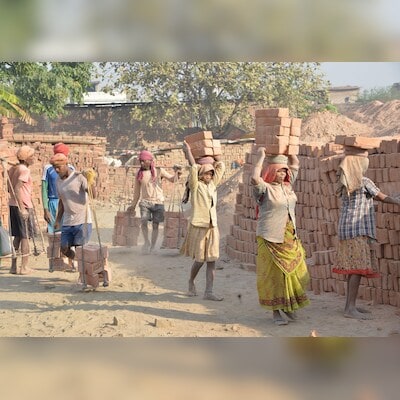Bonded labourer: representative image | (Photo: PTI)
The National Human Rights Commission (CNDH) informed the Supreme Court on Friday that it will discuss with the stakeholders and submit a “concrete proposal” to resolve the issue of immediate financial assistance to the rescued bonded labourers.
A bench comprising Justices BR Gavai and KV Viswanathan was hearing a petition seeking enforcement of the fundamental rights of trafficked persons as bonded labourers.
The question of providing them with immediate financial assistance arose during the discussions of the case.
Senior advocate HS Phoolka, appearing for one of the petitioners, said not even 10 per cent of such workers were receiving financial assistance or compensation.
He said the requesting organisation had rescued around 11,000 children, but only 719 of them had received financial assistance.
The lawyer who appeared before the NHRC said that she can sit down with the stakeholders and discuss this issue.
The court directed the NHRC counsel to hold discussions with the petitioners and other stakeholders to finalise the modalities.
“The NHRC counsel submits that it will discuss with all the stakeholders and submit a concrete proposal to resolve the issue of immediate financial assistance to the rescued bonded labourers,” the court said and posted the matter for hearing after four weeks.
In July 2022, the apex court agreed to hear the petition and sought responses from the Centre, NHRC and some states and union territories on the plea.
One of the petitioners said he and other bonded labourers were rescued and released on February 28, 2019, from a brick kiln in Shahjahanpur district of Uttar Pradesh, where they were trafficked by an unregistered contractor from their native village in Gaya district of Bihar.
The petitioner claimed that he and his co-workers were forced to work without receiving the legal minimum wage and that their fundamental rights to movement and employment were severely restricted.
(Only the headline and image of this report may have been reworked by Business Standard staff; the rest of the content is auto-generated from a syndicated feed.)
First published: August 30, 2024 | 16:07 IS
Disclaimer:
The information contained in this post is for general information purposes only. We make no representations or warranties of any kind, express or implied, about the completeness, accuracy, reliability, suitability or availability with respect to the website or the information, products, services, or related graphics contained on the post for any purpose.
We respect the intellectual property rights of content creators. If you are the owner of any material featured on our website and have concerns about its use, please contact us. We are committed to addressing any copyright issues promptly and will remove any material within 2 days of receiving a request from the rightful owner.

